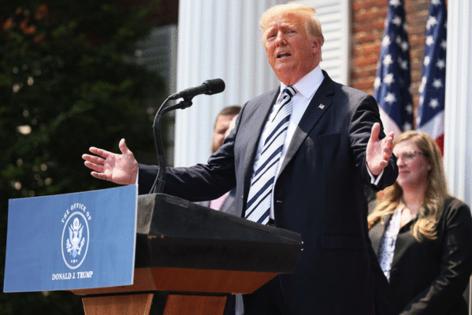Trump's immigration policies will cost Massachusetts billions, experts say
Published in News & Features
BOSTON — President Donald Trump’s campaign-promised plan to send millions of immigrant residents back to their home countries and his administration’s proposals to sharply curtail the number of immigrants legally allowed to enter the U.S. will have severe economic impacts on Massachusetts, according to a pair of experts.
Academic work shows that immigrants — legal or otherwise — can have a profoundly positive impact on the state economy, and their absence may be keenly felt by residents, according to Josh Bedi, the senior fellow in Economic Opportunity at the Pioneer Institute and a professor of economics at the University of Wisconsin-Superior, and Mark Williams, a master lecturer in finance at Boston University.
“I want to articulate how much the financial hit will be to Massachusetts: I’m estimating that next year, that tax revenue will decline by $1 billion, GDP will decline by at least $12.8 billion, and over the Trump administration — through 2028 — we’re looking at these numbers doubling,” Bedi said Tuesday during a webinar hosted by the Pioneer Institute.
That is because, according to Bedi’s research, “in general, immigrants make us more productive.” Entrepreneurial immigrants have contributed significantly to some of the state’s fastest growing economic sectors, he said, and the results of their efforts speak for themselves.
“In Massachusetts, specifically, they own or started half of Fortune 500 companies — either a first- or second-generation immigrant did,” he said.
According to Bedi, that equates to “billions of dollars in revenue” annually and “hundreds of thousands of jobs” for Bay State residents, regardless of their citizenship status.
Williams said immigrants make up about 15% of the U.S. population at the moment. Of that 48 million immigrants, about 12 million are thought to be “undocumented” or residing in the U.S. without a lawful presence.
“Both groups combined not only provide population growth, which we need within our U.S. population, they also provide growth within our labor supply and also with regard to needing certain jobs specifically for our economy,” he said.
In Massachusetts, about 29% of immigrant neighbors fill a “core role” in the labor force, Williams said.
“That is in STEM related jobs and that helps drive our knowledge-based economy,” he said.
Williams said that immigrants bring so much value to the Bay State that they represent both an economic strength and a sort of financial curse.
“This is our Achilles’ heel, in a sense. We’re used to importing top talent, and now all of the sudden that flow of talent is potentially being restricted and reduced,” he said.
Immigrants don’t take work away from anyone already residing in the U.S., Bedi said. Instead they fill roles that Americans aren’t doing or aren’t qualified to do, and in that sense “they actually don’t take jobs, they create more jobs, even if they are not entrepreneurs themselves.”
“Which implies that when we remove them, we also remove some jobs,” he said.
A policy brief released by Pioneer on Tuesday shows that the state cannot afford to lose any jobs at the moment.
The report, which comes bearing the title of “Massachusetts at Risk: The Alarming Decline of Private Sector Employment Growth,” found the Bay State third from last in job growth nationally over the last five years, “with a net contraction of 0.74 percent.”
“To stay competitive, vibrant, and prosperous Massachusetts must prioritize private sector growth. It must attract and retain talent, create a healthy business climate, and generate the conditions for startups and established firms alike to invest and expand,” the report reads.
Bedi said the solution to the immigration situation is a sort of “DOGE for immigration policy,” by which he means “regulatory slashing of our current immigration system.” There are too many barriers to entry, and too many hurdles to enter the economy, he said.
Bedi added, “We need to let them work, let them contribute, let them be taxpayers, let them open up businesses. Honestly, we need to get out of the way.”
_________
©2025 MediaNews Group, Inc. Visit at bostonherald.com. Distributed by Tribune Content Agency, LLC.







Comments